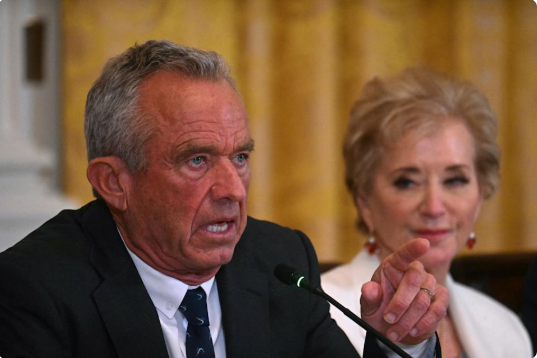Moderna's (MRNA) stock rose more than 3% in trading on Thursday despite an announcement that the National Institutes of Health (NIH), led by Robert F. Kennedy Jr., is ending a $750 million-plus contract to develop its bird flu vaccine late Wednesday.
"Moderna received notice that HHS will terminate the award for the late-stage development and right to purchase pre-pandemic influenza vaccines," Moderna said in a statement late Wednesday.
The Department of Health and Human Services (HHS) said in a statement to Yahoo Finance that the reason behind the terminated contract was the mRNA platform.
"This is not simply about efficacy — it's about safety, integrity and trust," according to the statement. "The reality is that mRNA technology remains under-tested, and we are not going to spend taxpayer dollars repeating the mistakes of the last administration, which concealed legitimate safety concerns from the public."
The company is currently in early-stage clinical trials and had expected to advance to late-stage trials with the help of HHS.
"Moderna will explore alternatives for late-stage development and manufacturing of the H5 program consistent with the company's strategic commitment to pandemic preparedness," the company said.
Moderna CEO St�phane Bancel said in a statement that the interim data showed positive results.
"While the termination of funding from HHS adds uncertainty, we are pleased by the robust immune response and safety profile observed in this interim analysis of the Phase 1/2 study of our H5 avian flu vaccine, and we will explore alternative paths forward for the program," he said.
Experts were shocked by the announcement on Wednesday. The former director of the Biomedical Advanced Research and Development Authority (BARDA), which is under NIH and had helped fund Moderna's vaccines, said it's a misstep at a crucial time.
"This is a huge mistake; one that will be measured in lost lives when these vaccines are needed … and they will be needed," Rick Bright said on X late Wednesday.
Bright recently co-authored a letter warning that the country needs to take seriously the reality of a bird flu pandemic. He served in the first Trump administration and played a key role in helping the country develop COVID-19 vaccines during the pandemic.
"It was President Trump's Operation Warp Speed that gave us mRNA vaccines," Dr. Ashish Jha, President Biden's former White House COVID-19 response coordinator, wrote on X. "These vaccines have been administered nearly 2 billion times to hundreds of millions of people around the world."

2028 in question
This is the latest blow to Moderna's mRNA pipeline. Robert F. Kennedy Jr.'s HHS has been aggressively cutting vaccine development and casting doubt on the mRNA platform. The agency is wary of reports of myocarditis and other adverse events that followed vaccinations during the pandemic.
Just last week, Moderna "voluntarily" and "in consultation with" the FDA withdrew its flu-COVID combination vaccine application, with the intent to resubmit later in the year. The company had been counting on it and other vaccines in the pipeline to make up for the loss in COVID-19 vaccine revenue in recent years.
That's a significant drop from the full-year 2022 revenue, when the company peaked at $19.3 billion during the pandemic.
Earlier this month, Leerink Partners analyst Mani Foroohar wrote in a note that Moderna's goal of breaking even by 2028 was in question in light of the combo flu pullback and because first quarter earnings for the year came in below Wall Street's expectations.
JPMorgan analyst Jessica Fye similarly echoed that cost-cutting measures announced during the first quarter earnings, to be achieved by 2027, would be "well received as we have thus far been unable to get the model in line with MRNA’s goal of break-even on a cash cost basis by 2028."
Still, Moderna has remained confident about its future products. One positive has been Moderna's partnership with Merck (MRK), pairing Merck's blockbuster cancer drug Keytruda with an mRNA cancer vaccine.
But that has spurred questions about the company's future — and whether or not it can retain its first-mover lead in the mRNA space. Experts have wondered whether it is better off being acquired or if it should sell part of its portfolio to a Big Pharma player.